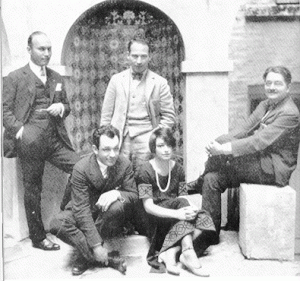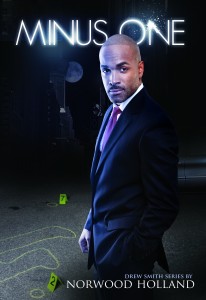A Conversation with Brian Boger
January 17, 2014
When I first picked up Southern Fate I thought because the author was an attorney it was just another legal thriller, but the opening didn’t neatly fit into the thriller formula. I read on thinking perhaps it was a mystery but the first body didn’t show up until Chapter 9. Obviously not a mystery, so I read on and suddenly it swept me up and blew me away like a hurricane. The genre was literary and quintessentially Southern with elements of both mystery and thriller. The novel centers on the inner story of a South Carolina attorney Frank Rhodes and the journey to his fate and fortune.
Introduced as a rather pathetic character Frank Rhodes is an accident prone klutz and a mediocre lawyer whose only passion is hunting and fishing. The only thing making him worthy of attention is his extreme good looks. Suddenly things change for Frank in a big way when he lands a windfall judgment instantly propelling him into the national spotlight. On the road to money and fame he soon learns the bad news his wife is leaving him for another women. And things get complicated quickly when a serial arsonists plaguing the city with one of the first victims being a member of Frank’s non-traditional family. Meanwhile his brother teaches him an unorthodox method on how to get develop rhythm to thereby overcome his clumsiness, a lifelong affliction.
There is much going on in Southern Fate with numerous subplots. The book is full unexpected plot twists and Boger takes the reader into areas past traditional Southern writers feared to tread. He incorporates several popular motifs commonly found in Southern literature including sense of family and sense of place. However we see some newer motifs developing. For example the non-traditional family and same sex relationships. At a young age Frank’s father was killed by a burglar. His mother and another single windowed mother with a son of similar age merged households to form a non-traditional family headed by two women. While these women are heterosexual another non-traditional family with young children taking root when Frank’s wife leaves him for her same sex lover with young children. These types of non-traditional modern family models are uncommon in traditional Southern literature but realistically capture today’s society. Lesbian relationships have rarely been openly presented in such openly fashion and again capturing the dynamics of today’s modern families.
Another traditional motif is the sense of place. Southerners are exceedingly proud of their region and as social historian Carl N. Degler once described the South as a region “where roots, place, family and tradition are the essence of identity”. All of which are apparent in Southern Fate which in this jet age moves from Columbia to Charleston, New York, the Bahamas and Costa Rica. However, make no mistake the stories beginning, middle, and end are deeply rooted in Columbia, and Boger does not spare the details of Columbia’s rich Civil War history recounting the tales of Sherman’s march. Indeed the ghost of the War against Northern Aggression and the horrors Columbia faced under Sherman conjures up a deus ex machina villain the serial arsonist. Like Bo Radley suddenly arriving on the scene and not a moment too soon.
This is perhaps the books one major shortcoming. We never get to know the villain or his motivations only that he has targeted women belonging to the Daughters of the Confederacy in the name of Sherman. There are no red herrings or clues to suggest anything about the character and his motivations. The villain emerges in the end and disappears in a puff of fire and flames. As a reader in the end I was left frustrated with too many questions as was Frank. Perhaps this was the author’s intent.
As social issues and politics evolve with time so does a society’s literature, and Southern Fate stands as an exemplary work of modern Southern literature. The author is a practicing attorney, the father of three. He and his wife live in Columbia where he studied law. He also holds a degree in English from the University of Virginia. Brian Boger pushes the boundaries and thereby expands the conventional motifs placing him among the vanguard of new Southern writers.
I would dare suggest being on the future lookout for Brian Boger. He expects to release his second title in 2014. When asked about the project, he says “the working title is Champagne Friday. It’s another legal thriller type book with some (surprise) literary themes like loss, redemption, vindication, and young men leaving their Bacchanalian Rite of Passage behind them for good women. It’s a humdinger of a book developing strong female characters appealing to a broader female audience. The women are cool.”
If the women are anything like the men of Southern Fate it should indeed be a humdinger. Southern Fate is an incredibly delightful read, rich with local color and chocked with quirky characters. Boger’s voice and style are a cross between John Gresham and John Brendt. The state capital Columbia might want to get behind their adopted favorite son because Southern Fate could very well do for Columbia what Midnight In the Garden of Good Evil did for Savannah.
Tips on developing your networking strategy
June 27, 2013

Circa 1919—the famed Algonquin Round Table with members Harpo Marx, Art Samuels, Alexander Woolcott, Charlie MacArthur, and Dorothy Parker. (Tumblr)
When asked to use the word horticulture during a game of Can-You-Give-Me-A-Sentence, Dorothy Parker replied: “You can lead a horticulture, but you can’t make her think.” Known for her caustic quick wit Dorothy Parker was a founding member of The Algonquin Round Table, the 20th Century’s most powerful and prolific literary network. It was a veritable nucleus of intellectual energy. At its core were founding members Vanity Fair writers Dorothy Parker, Robert Benchley and Robert Sherwood. It started as a casual lunch group meeting daily in the Algonquin Hotel’s Rose Room and grew to include a host of writers and critics including Edna Ferber, George S. Kauffman, Heyward Broun, Mark Connelly, and Donald Ogden Stewart among others. Society columnists coined the name The Algonquin Round Table and the group did what networks usually do: exchange gossip, ideas, trends, information on jobs and writing assignments from New York to Hollywood.
Round tables are traditionally about connections serving as educational and networking tools. It’s not necessary to join a roundtable to network effectively. The easiest way to tap into a professional network is by actively attending conferences and rubbing elbows with the industry professionals, movers and shakers.
Networking can establish relationships that open doors with information and education. Always sign up for a conference with a particular goal or purpose in mind. Consider it an opportunity to meet new people who can give you new leads opening up new possibilities. Think about what it is you plan to accomplish or take away–and above all–sharpen your networking skills.
In developing your networking strategy remember the Boy Scout motto: Be Prepared. Do your homework by researching those who will be presenting at the conference. When the opportunity presents itself make your presence known. Armed with certain background information you will be surprised how the conversation will flow. Research the presenters and panelists who will be discussing the topics relating to your interest. Consider introducing yourself with an advance email to the particular presenters and practice your introduction.
Have an elevator speech ready encapsulating your background and goals in making your acquaintance. Get to the point quickly and try to be engaging by showing interest with eye contact. Have your business card updated with your email and contact particulars. The business card lays the groundwork for the follow up and a long term connection.
Don’t forget to mind your manners. After your gracious introduction know when to excuse yourself and walk away. Be considerate. Nothing is worse that standing waiting your turn to introduce and speak with a presenter only to have another greedy attendee monopolize the Q&A time. Be courteous and considerate of the time of the presenter and the other conference attendees. If you cannot get to the presenter try to speak with an event organizer, a team member or their publicist if one is present. They too can prove to be vital connections. Remember, it’s about building relationships.
Above all, ask questions and don’t push your products or run your mouth a mile a minute. Prepare a couple of questions in advance and be prepared to listen. Be honest in your approach and don’t be pretentious by name dropping or inflating your background.
You don’t have to be as charming and as witty as Dorothy Parker or belong to a roundtable, but do have some culture. Enjoy yourself meeting, greeting and making new connections. Moreover nurturing those new connections can help in building your business and your brand going forward.




